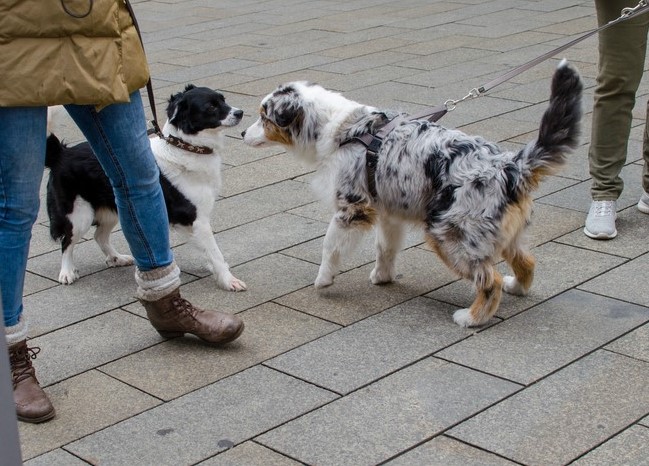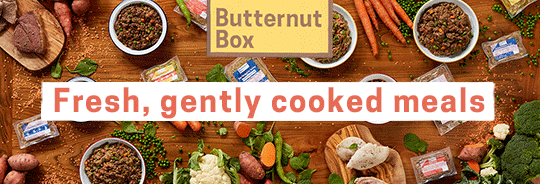ARE GROUP MEET-UPS AND WALKS GOOD FOR MY YOUNG DOG?

There are a number of new trainers and daycares in the area that have recently set up and are offering 'socialisation walks', 'breed meet-ups' and 'puppy socialisation playdates'.
Many people understandably like the idea of these so that their dog gets to 'play with other dogs' and 'be around other dogs', but I personally would be avoiding like the plague for several reasons....
If you have a young puppy, an adolescent pup or an adult dog that is prone to excitement and high arousal, these sessions will simply cause your dogs to develop problems.
Most dog trainers would not recommend any form of meet-ups like this for a number of reasons...
Arousal Problems
These types of meets create huge excitement in the dogs. My main philosophy with training young dogs is to teach calmness and appropriate behaviours in different settings, thinking about the long term goals for your dog's behaviour as an adult further down the line. Yes, some off-lead play is ok but it should be with one suitably matched dog (probably a calm adult dog that isn't going to teach your young excitable dog to be a lunatic).
Young dogs cannot manage their arousal levels. If they regularly learn to get super excited whilst out on walks, they will form a habit and will never get to the point where they can manage their arousal levels on their own.
The same goes for daycares too - we see many problems arising because of the 'free play' nature of the daycares.
On-Lead Walks
The group lead walks teach your dogs that excitement/high arousal play/fun dog greetings while on lead are acceptable. Your main training emphasis should be about teaching appropriate behaviour whilst on lead and teaching your dog to ignore other dogs whilst on walks.
If you let your puppy do lots of dog to dog greeting, you are simply promoting that excitement and will very soon have a dog that is crazy out on walks and they will start ignoring you much more in daily life. Your lead walking skills will get worse, as will your recall and general responsiveness. You will simply end up with a dog that completely ignores you whilst out and about.
Lead Greeting Problems
Unless you are a pro when it comes to dog body language and dog to dog communication, lots of on-lead greetings can easily develop reactive behaviour, whether it be driven by fear/anxiety or hyperarousal and frustration.
When dogs are greeting each other on lead, they are effectively forced into a head on confrontation. The natural way for dogs to greet each other is to arc around and sniff each other's back ends. Head on confrontations are rude in the dog world. Add to that the fact that there will be tension on the leads, you increase the emotions in the dogs. If their fight or flight mechanism kicks in, they can't run away because they are on lead. Therefore they will default to fight and may start to develop reactive behaviours over time.
Whilst you may be watching your lead greetings and think your dog is having a nice time and is making friends, chances are us professionals will cringe and worry about the fallout! It is rare to see comfortable and relaxed lead greetings with any dogs from different households.
Off-Lead Problems
Chaotic off lead sessions with lots of dogs in an unmonitored setting teach your dog that high arousal play is ok. If you have a young dog that is still learning about what is and what isn't appropriate when it comes to off-lead play, they will simply learn to be an excitable bouncy lunatic and may even end up getting bitten due to their rude play styles as they get older.
So what SHOULD I be doing?
- Avoid these types of meet ups for a start.
- Focus on your training foundations, building the relationship between you and your dog so that they become more attentive towards you whilst out in public and pay less attention to the other dogs around!
- If you have a puppy under 16 weeks, only let them greet one in about fifteen dogs. That greeting should be for three seconds only. For the other dogs you see, give your puppy plenty of space to calmly observe from a distance and reward them for being calm.
- If you have a puppy/adolescent dog over 16 weeks, I personally wouldn't let them have any on-lead greetings unless they can be calm whilst doing so. If you know they will get really excited and cannot greet appropriately, don't do any on-lead greetings until you can improve your training. Otherwise you are strengthening the habit. They will NOT calm down with age and will not 'grow out of it'.
- Arrange playdates with one calm adult dog at a time at a secure field so that your pup can spend time around another dog without the adult dog winding your puppy up. You want your pup to learn about appropriate dog behaviour and dog play from another dog who can teach them good manners. Having playdates with other young/excitable dogs will just teach them to be more giddy! The playdates should be kept short. Break the time up if needed so that they have ten minutes off lead and then pop them on the lead to do some calm parallel walking for five minutes before letting them off again. Remember; your puppy cannot manage their own arousal levels. It is up to you to manage this for them!
- Spending time around other dogs in an appropriate manner is beneficial, but consideration should be given as to the scenario you set up. Meeting a friend or family member with a calm adult dog for some parallel lead walks can be great for promoting calmness without the pressure of stationary greetings that are often fraught with excitement. Anxious dogs or dogs lacking in confidence can build confidence in these scenarios because the pressure is taken off them.
- Carry on with training classes! Your puppy training classes should be the start of your training journey, not the complete journey. Trying to navigate through adolescence without continuing your training in a controlled training environment is not advisable. Our group training classes give us the opportunity to work on issues such as inappropriate greetings and too much interest in other dogs to help your pup develop into a calm, well-behaved adult dog who is a joy to take out in public.


